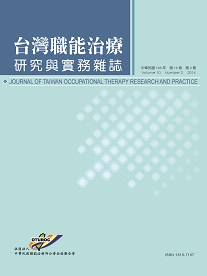Journal of Taiwan Occupational Therapy Research and Practice

半年刊,正常發行
目的:瞭解目前國內公立療養院使用於精神分裂病患之職能治療評估工具其心理計量特性及實務上使用的時機。方法:以8所公立療養院為對象,收集職能治療部門對精神分裂病患例行性之評估工具及使用時機。工具之心理計量特性以檢索MEDLINE,PsycINFO,CINAHL,及中華民國期刊論文索引系統查證。結果:75%(含)以上單位使用之評估工具共有9項。其中4項評估工具完全缺乏針對精神病患的信度、效度證據。在使用時機方面,大多為視需要使用;然而在結案時很少使用評估工具評量個案。結論:多數臨床常用的評估工具缺乏完整的心理計量驗證,建議加強國內臨床常用評估工具之心理計量特性驗證;此外,在評估時機方面應增加個案結案時之評估,以利掌握個案變化。
Purpose: To investigate the psychometric characteristics and of the clinical measures the timing for using these measures in patients with schizophrenia at the departments of occupational therapy in the public psychiatric centers. Methods: Therapists in 8 public psychiatric centers were surveyed. The assessment tools as well as their timing for using measures in schizophrenic patients at the departments of occupational therapy were investigated. The psychometric characteristics of the assessment tools were investigated through searching the MEDLINE, PsycINFO, CINAHL and Chinese Periodical Literature databases. Results: Nine of the assessment tools were used in more than 75% of the public psychiatric centers. Among them, the reliability and validity of 4 assessment tools have not been well established for psychiatric patients. Regarding the timing of using the assessment tools, most of the assessment tools were used for the needs at that time. However, few assessment tools were used to evaluate the patient when discharged. Conclusions: The psychometric characteristics of most assessment tools had not been well established. We therefore suggest that the psychometric characteristics of the assessment tools need to be established. Furthermore, assessments need to be administered when patients were discharged so that the progress of the patients could be well identified.












